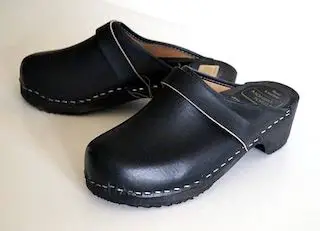To ‘pop your clogs’ is to die.
Pop your clogs
What's the meaning of the phrase 'Pop your clogs'?
What's the origin of the phrase 'Pop your clogs'?
The euphemistic expression ‘pop your clogs’ originated in the UK. Sadly, whoever invented the phrase didn’t make it clear why it meant ‘die’.
There have been some speculation about the phrase’s coinage, as is always the case when the origin of an evocative sounding phrase is sought. Clogs clearly refers to wooden shoes – it could hardly be anything else. What isn’t so clear is the meaning of ‘pop’.
Theory number one is that the pop being referred to is the synonym of ‘pawn’, as is also theorised as the origin of ‘pop goes the weasel‘. ‘Popping’ has indeed been used to mean pawning since the early 18th century. However, the sense seems rather strained for pawning to be the origin though as, if someone dies, it would be someone else who pawned/popped the clogs so ‘popping one’s clogs’ doesn’t quite make sense.
Theory number two is that the ‘pop’ just meant ‘die’, as in ‘pop off’. This has a little more going for it as ‘pop’ has existed in the language meaning ‘die’ for several centuries. It is found in Samuel Foote’s comic play The Patron, 1764:
If lady Pepperpot should happen to pop off.
Other, more fanciful, explanations have been put forward. One correspondent of mine suggested that it referred to a person’s clogs popping off following the swelling of their feet after death. Why a dead person might be wearing clogs wasn’t explained.
However, it may be that none of the above is the source of the expression and that ‘pop your clogs’ may just be a nonsense phrase with no particular meaning, like ‘hopping off the twig’. The late arrival of the phrase does suggest it being deliberately coined to sound old and meaningful. That theory is lent some support by the text that is the earliest known example of ‘pop your clogs’ in print. that’s in a comic piece entitled Hawporths O’ Yorksher, published in the Yorkshire newspaper the Shipley Times and Express, May 1914.
[A hapworth is a Yorkshire dialect version of halfpennyworth, that is, a small allocated portion of something – in UK parlance a ‘dollop’.]
Be warned; the writer of the piece goes to some lengths to lay on the ‘ay up’, ‘by gum’ Yorkshireness, still used by stage Yorkshiremen today. Here goes…
A Joakin’ Parson.
A parson whoa preyched t’ anniversary sarmons at t’ Idle Baptist Chapil [Idle is a district of Bradford, Yorkshire] capped t’ congregation wi’ t’ annanncement, summat like this: “T’ choir ‘ll nah sing; be nut afraid.” T’ fowk wondered what they hedn’t ta be fraid on, but they “tumbled” when t’ choir strewk up t’ anthem “Be not afraid.” T’ same parson said ‘at it wor noa ewse botherin’ abaht pilin’ brass up, ‘coss noab’dy could tak’ it wi’ ’em when they popped ther clogs; in fact, he said, it ‘ud melt afoar they gat ta t’ other side. He must think rich fowk ‘ll hev a wahrm passage as weel as a wahrm reception!
A modern-day English translation of that is:
A Joking Parson.
A parson who preached the anniversary sermons at the Idle Baptist Chapel surprised the congregation with the announcement, something like this: “The choir will now sing; be not afraid.” The folk wondered what they hadn’t to be afraid of, but they “tumbled” [realised] when the choir struck up the anthem “Be not afraid”. The same parson said that it was no use bothering about piling brass [money] up, because nobody could take it with them when they popped their clogs; in fact, he said, it would melt before they got to the other side. He must think rich folk will have a warm passage as well as a warm reception!
The case for a Yorkshire origin is given another boost by the reasonable assumption that the phrase originated in an area where people wore clogs, which many did in the north of England in 1914. Having lived in Yorkshire for 50 years I quite like the idea that we have an expression that we can lay a good claim to.
It doesn’t appear that ‘pop one’s clogs’ was widely used. After that 1914 example it isn’t found again until the humorous magazine Punch picked it up in the 1970s, as in this from the Pick of Punch for that year:
He was forced to retire in 1933 after a disastrous Catholic/Protestant punch-up among the bugs. He’s just popped his clogs.
Punch includes it several times after that date and some of their examples relate to the north of England. Other writers began using the expression and it became commonplace from the 1970s onward.
1914 to 1970 is quite a stretch of time for a phrase to be remembered and passed on but not to appear in print. However, a second independent coining by a Punch contributor in 1970 with the same meaning as the 1914 usage is a stretch of credulity. Punch popularised ‘pop your clogs’ but the best bet for a source is Yorkshire in the early 20th century. What ‘pop’ really meant remains a mystery.
Related phrases and meanings
Browse more Phrases
About the Author

Phrases & Meanings
A-Z
A B C D E F G H I J K L M N O P Q R S T UV W XYZ
Categories
American Animals Australian Bible Body Colour Conflict Death Devil Dogs Emotions Euphemism Family Fashion Food French Horses ‘Jack’ Luck Money Military Music Names Nature Nautical Numbers Politics Religion Shakespeare Stupidity Entertainment Weather Women Work
How did we do?
Have you spotted something that needs updated on this page? We review all feedback we receive to ensure that we provide the most accurate and up to date information on phrases.
